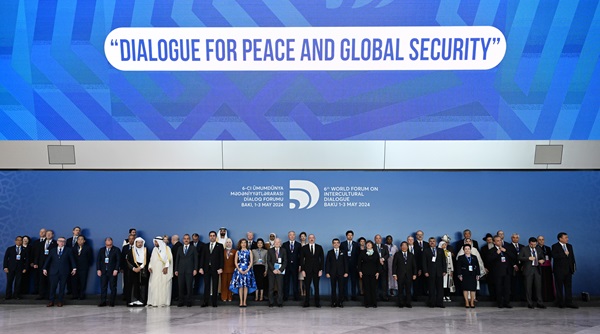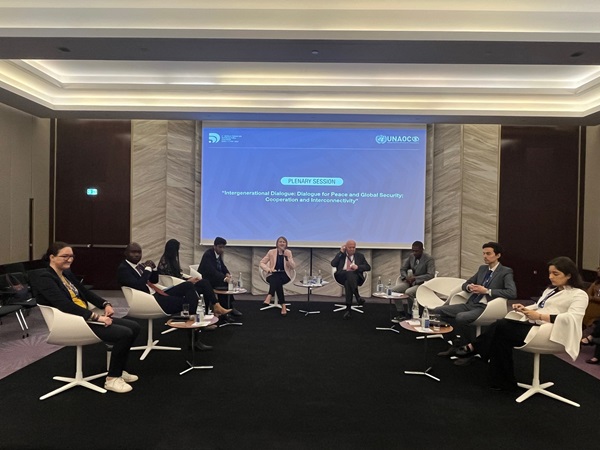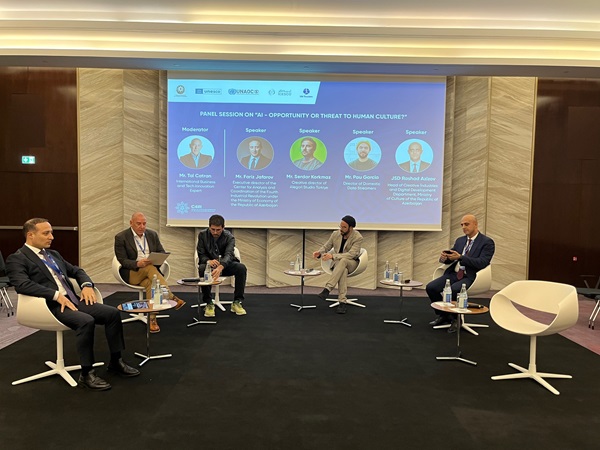 Credit: Chronicle.lu
Credit: Chronicle.lu
The 6th World Forum on Intercultural Dialogue is being held in Baku, Azerbaijan from 1 - 3 May 2024, at the Baku Convention Centre, with 700 delegates from 100 countries worldwide.
After most delegates arrived in Baku on Tuesday 30 April and registered, a Welcome Dinner (standing buffet style) was arranged with a four-piece orchestra performing background music after a brief welcome address.
Opening Ceremony
On Wednesday morning, the Opening Ceremony took place, entitled "Dialogue for Peace and Global Security: Cooperation and Leadership in Interconnectivity", at which a short film about the forum was screened which featured horse-drawn wagons and early-model cars.
Ilham Aliyev, President of the Republic of Azerbaijan, addressed the Forum as well as senior representatives from international organisations, including the United Nations, UNESCO and others. Amongst the topics addressed were religious tolerance and mutual respect, referencing interfaith dialogue and the importance of dialogue where former enemies can work together to develop a narrative, building trust and restoring solidarity. There was also a reference to the COP29 being held in Baku in 2024.
President Aliyev stated that he is strongly committed to multilateralism and that intercultural dialogue within Azerbaijan has always been positive and that representatives of various ethnic and religious groups living in Azerbaijan are "patriots of state", adding that Azerbaijan has been a crossroads of cultures for centuries.
Miguel Ángel Moratinos, Under-Secretary-General, High Representative for UNAOC, and Salim M. AlMalik, Director-General of ICESCO also addressed the event. The global dialogue addressed cultural diversity and solidarity, and a global network of peace ambassadors which hopes to reach 500 by 2025. There was reference to the growing global arms trade.
Gabriela Ramos, Assistant Director-General for the Social and Human Sciences of UNESCO, said that she was looking forward to the dialogue on the different areas under the umbrella of intercultural dialogue which are addressing topics as diverse as climate change and artificial intelligence, particularly in a world of declining trust. She also mentioned gender equality and welcomed the number of women invited to speak and participate in the forum. She addressed the process of reconciliation and intergenerational dialogue.
Tourism was also included, with Zorista Urosevic, Executive Director of UN Tourism, stating that 1.3 billion people crossed border for tourism in 2023, where people discover about the world and build social capital. Global understanding increasing but wars, climate change, economic downturns, etc., are challenges being faced, calling for collaborative thinking and co-creation.
Morning Plenary Sessions
Following a break, two parallel Plenary Sessions were held, one on "Leveraging Soft Power for Multilateral Strength: Bolstering compassion, building solidarity, and resisting fragmentation", with the Keynote address delivered by Gabriela Ramos (Assistant Director-General for the Social and Human Sciences of UNESCO). A panel discussion was then moderated by Prof. Mike Hardy (Founding director of the Centre for Trust, Peace and Social Relations, Coventry University, chairman of the International Leadership Association), with: Alexandre Zouev (Assistant Secretary-General for Rule of Law and Security Institutions in the UN Department of Peace Operations), Jean-Christophe Bas (Founder of the Connecters for Peace and The Global Compass, Senior Advisor of the Brazzaville Foundation), Soltan Mammadov, Member of Milli Majlis of (Azerbaijan, Heydar Aliyev Foundation), Gladden Pappin (President of the Hungarian Institute of International Affairs), Effenus Henderson (Co-Director of the Institute of Sustainable Diversity and Inclusion, President
and CEO of the Henderworks Inc, DEI Thought Leader, USA), Amb. I Gusti Agung Wesaka Puja (Executive Director of ASEAN Institute for Peace and Reconciliation (ASEAN-IPR)), and Asmita Satyarthi (CEO of the Satyarthi Movement for Global Compassion).
The second one, attended by Chronicle.lu, was on "Intergenerational Dialogue: Dialogue for Peace and Global Security: Cooperation and Interconnectivity", with the Keynote address delivered by Miguel Ángel Moratinos (High Representative for UNAOC; Spain), with Anna Pavlyuchenko (UNAOC) facilitating the panel discussing involving: Joseph Briefel (Fellowship Programme, UK), Vera Al-Mawla (Youth Solidarity Fund; Lebanon), Atif Rashid (Empowering Dialogue and Interfaith Networks; UK), Hana Mbida (News Generation Against Hate; France), Ketrin Marpaung (Intercultural Innovation Hub; Indonesia), Alister Charles (Intercultural Innovation Hub; South Africa), Gracian Mkandawire (Global Sports Programme, Malawi) and Leyla Hasanova (COP29 Youth Climate Champion; Azerbaijan).
The first part of this session addressed good practices for counteracting violent extremism, religious hatred and intolerance and was entitled "Good practices on preventing violent extremism through the promotion of interreligious and intercultural dialogue, sports and other innovation tools". In essence, it was a series of testimonies of individuals who had aspired to leadership positions in different domains and scenarios, and who recounted the challenges they faced and how they overcame them, while others were practitioners and who helped collect and disseminate such information. On the issue of climate change, the question was raised of whether to save the planet or save humanity; the main point raised was that one needs to act now and start by start by saving the planet which is a step to saving humanity.
Miguel Ángel Moratinos focussed on eradicating threats, bringing instruments to the ground to change the minds and hearts of people, carrying a clear message that there there is a different solution, an alternative. He echoed the words of the panellists who demonstrated that carrying such messages through culture and sport do work. He also stressed that compromise is important to be able to work together. One of the other issues raised was rhetoric, with many young people fed up with much talk and discussion, but little action. He also praised the values, diversity and educational platform, etc., of sport.
The second part of this session was entitled "Placing young people and women at the forefront of peacebuilding efforts" and was moderated by Dana Podmolikova (UNAOC) the second part of the panel which included Nargis Azizova (Policy Advisor - Women, Peace and Security, UN Women Regional Office for Europe and Central Asia), Merihan El-Salakawy (Fellowship Programme; Egypt), Lynda Nkechi Emmanuel (Young Women Peacebuilders; Nigeria), Leen Alsadig (Young Women Peacebuilders; Sudan), Jason Wee (Youth Solidarity Fund; Malaysia), Zia Ullah Baloch (Youth Solidarity Fund; Pakistan), Nuria Madawili (PLURAL +; Tanzania), Flora Saïl (News Generations Against Hate; France) and Xiomara Acevedo (Intercultural Innovation Hub; Colombia).
The second part of the discussion started with testimonies from the panellists (women and young people) and evolved to building on and sharing those experiences. It is not just about inclusion, it is also about recognising their (of youth and women) capabilities and capacities. Another thread that was raised was championing social cohesion for peace-building. 14-25s was described as the crucial age group for empowering young people. Using the power of storytelling and technology were also identified as crucial to raise awareness and carry messages, as were art and culture.
Afternoon Panel Sessions
In the afternoon, the 5th Ministerial Conference of the World Forum took place on "Harmony in Diversity: Fostering Intercultural Dialogue for a Global Cultural Renaissance", chaired by Adil Karimli (Minister of Culture of the Republic of Azerbaijan), in parallel with the 3rd High-Level Meeting of International Organizations on "Sustainable Pathways for a Greener Future: Collaborative Actions for COP29 and Beyond", with Mukhtar Babayev (Minister of Ecology and Natural Resources of the Republic of Azerbaijan) and Yalchin Rafiyev (COP29 Lead Negotiator) both delivering keynote addresses.
Also held in parallel in the afternoon were four panel sessions, on "The Role of Education and youth engagements in Combating Xenophobia and Discrimination", "Enhancing available and flexible regular migration pathways to address irregular migration: creating the conditions for sustainable development", "AI - opportunity or threat to human culture?" and "Empowering Women's Rights through Intercultural Dialogue: A Pathway to Global Progress".
Chronicle.lu attended the AI session which examined if AI is an opportunity or a threat to human culture; it was addressed by Gabriela Ramos, Assistant Director-General for the Social and Human Sciences of UNESCO. She introduced the topic by explaining that AI is a societal, not technological conversation, e.g. does this lead to a more inclusive society? She also raised the issue of generative AI and ChatGBT, whose capacities are ten times more extensive. How can AI help climate change when data centres consume so much electricity? How can it become more inclusive? She explained that we much change the narrative, to change algorithms, to examine regulation and stated that governments have a duty of care.
Tal Catran (International Business and Tech Innovation Expert) moderated the panel which included Fariz Jafarov (Executive Director at the Ministry of Economy of Azerbaijan), Serdar Korkmaz (Creative Director of Alegori Studio, Turkey), Pau Garcia (Director of Domestic Data Streamers) and Rashad Azizov (Head of creative Industries and Digital Development Department, Ministry of Culture, Azerbaijan).
The moderator talked about embracing AI for cultural enrichment and that the panel was there to address potential risks from AI for culture and diversity.
Fariz Jafarov explained that AI is currently using data to revolutionise the creation of culture and other areas. AI can help urban transformation, which can incorporate autonomous vehicles, as well as agriculture and port management, to give but a few examples, but it relies of real and accurate data. Also, AI can be used in 3D mapping of historical objects impacted by natural disasters and human conflict; and it can also be used in preserving and translating endangered hieroglyphic languages.
Serdar Korkmaz talked about artistic and cultural creativity and highlighted AI's efficiency as it offers new tools and techniques, including visualisation. It is also accessible to everyone and brings cultural diversity.
Pau Garcia talked up the scale and impact AI can have. He emphasised the problem that AI is led by people from a technical, from an engineering background. He used the example of social media influencing society, as well as saying that AI could be used to help people with memory loss.
Last to speak, Rashad Azizov talked about AI helping us to make choices. An ethical question then arises: who is the author of the creation, the AI or the person who uses AI? This is a huge issue from the legal perspective, regarding intellectual property rights. He said that regulation should be at different levels, at using AI in our daily lives as well as how we create AI, and that this should be done at an international level as it affects our future cultural heritage, especially for small nations. He stressed the cultural diversity regarding AI and concluded by stating: "Without art we do not have artificial intelligence".
To conclude, it was stated that AI is part of the evolution of computer invention which has been created and slowly educated in different ways by different people. There is a race between different ideologies so that the future can be shaped by them: the question then is how we can use AI without losing humanity. One answer is that culture and art can provide the light.
3rd Plenary Session
To close the first day's proceedings, the 3rd Plenary Session was held, entitled "Confidence building through Interfaith Dialogue", with Keynotes delivered by Sheikh-ul-Islam Allahshukur Pashazadeh (Chairman of the Caucasus Muslims' Board, Co-Chair of the Interreligious Council) and Miguel Ángel Moratinos (Under-Secretary-General, High Representative for UNAOC).
A panel discussion was then held with representatives of different religions and civil society, moderated by Nihal Saad (Director of UNAOC) with the following panellists: Judge Mohamed Abdel Salam (SG Muslim Council of Elders); Matthew Kukah (Bishop of Catholic Diocese of Sokoto); Rabbi Gady Gronich (CEO & Chief of Staff of the Conference of European Rabbis); Dr Mohamed El Sammak (Secretary General of Islamic Christian National Dialogue Committee, Lebanon); Dr Ibrahim Negm (Advisor of the Grand Mufti of Egypt); Monsignor Khaled Akasheh (Secretary, Commission for Religious Relations with Muslims of Dicastery for Interreligious Dialogue); Dr Mohamed Bechari (Secretary General of The World's Muslin Community Council); Sarra Messaoudi (MENA Peacebuilder (UNAOC alumni), Tunisia); Ambassador Khalid Fathalrahman (Director of Civilizational Dialogue Center of ICESCO); and Dr Taras Dzyubanskyy (Action Institute/Collins Center, UNAOC facilitator of the EDIN Project (Empowering Dialogue of Interfaith Network), Ukraine).
Nihal Saad introduced the discussion by stating that peace is inherent in almost almost all religions across the faith spectrum, highlighting tolerance, compassion and empathy, with interfaith dialogue promoting social cohesion. She called on religious leaders and civil society leaders to continue such interfaith dialogue, and referenced young people as bridge-builders and game-changers. She also referenced religious sites and places of worship across the world.
Sheikh-ul-Islam Allahshukur Pashazadeh expressed the importance of this interfaith dialogue which will play an important component and contribution. He talked about religious hatred, mentioning attacks on mosques as examples of xenophobia which he underlined as being unacceptable.
Miguel Ángel Moratinos commended religious leaders for coming together to work together for the future. He referenced the evolution to a more materialistic world; yet, spirituality is returning to society and emphasised that the future should be shaped by spirituality and ethics. He talked about the UN initiative to map religious sites across the world, as well as religious leaders to work together to prevent attacks. The main challenge today will be what we call artificial intelligence, not climate change: he asked if machines will have a conscience and if robots will have a religion? We need religious leaders to remind us that we are humans, that we have spirituality.
At the end of the formal sessions, Gabriela Ramos, Assistant Director-General for the Social and Human Sciences of UNESCO, was interviewed and highlighted the programme "we need to talk" involving different people from different backgrounds. When asked about various conflicts, she responded by stating that there is a "very sad" situation in Palestine, and also in Ukraine: however, she stressed that this is not the aim of the forum, not a conflict resolution conference, and not a conflict avoidance conference. Instead, she emphasised that we see challenges in our society and we need to address them and to develop strategies that will help peaceful resolution of any conflict.
The evening concluded with a Gala Dinner at the nearby Heydar Aliyev Cultural Centre.












